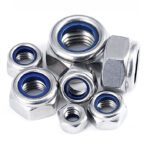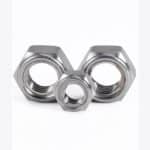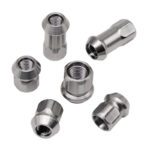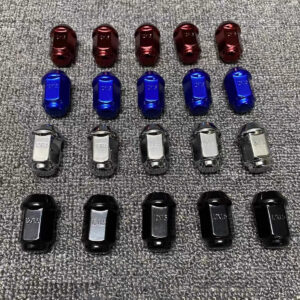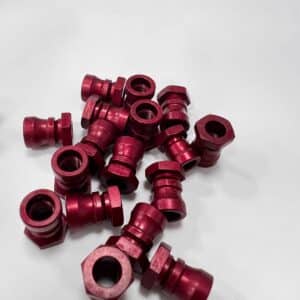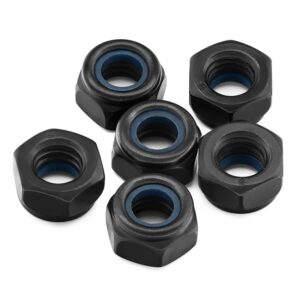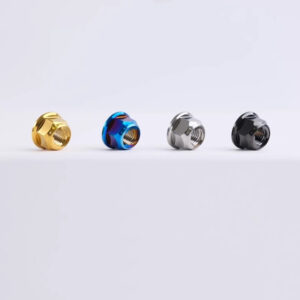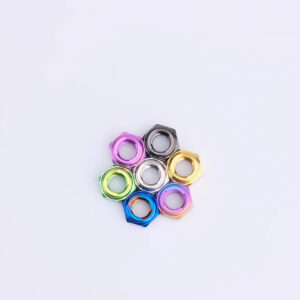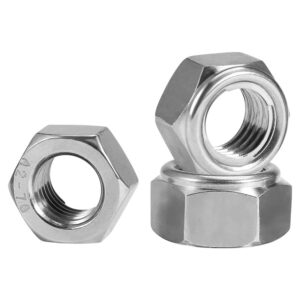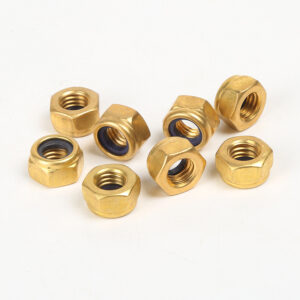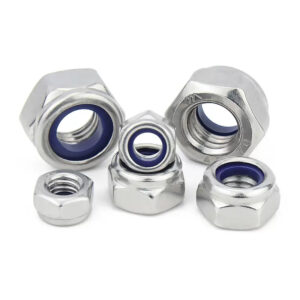- +86 18015401692
- sales@fastenmetal.com
Trusted by Over 1000 Customers All Over the World
Locking Nuts
Locking Nuts means attaching a nylon loop to inner threads of nuts for tight locking purpose. Locking nuts are widely used on machines, vehicles (bikes, cars, aeroplanes), and they create additional friction to stop the nut from loosening. FastenMetal is one of the best locking nuts manufacturers In China,we provide a wide range of different types and sizes locking nuts.We also manufacture special self-locking nuts according to customer drawings.
- 2 Self-owned Factories
- ISO 9001:2015 certificated
- Hundreds of Suppliers




Gallery of Locking Nuts
-
Forged Wheel locking nuts
Add to cartWheel locking nuts are specialized fasteners designed to secure vehicle wheels and prevent theft. They typically feature a unique pattern or key, requiring a specific tool to remove, which deters unauthorized removal. These nuts offer both security and reliable fastening, commonly used on cars, trucks, and motorcycles to protect wheels and ensure they stay tightly secured during use.For quotes,inquiries,or non-standard fasteners request, please feel free to click the button”get a free quote”.
Material: Stainless Steel
Finish:Color Plated
Size:M12
Strength Grade:Grade8.8,10.9.12.8
Deprecated: preg_replace(): Passing null to parameter #3 ($subject) of type array|string is deprecated in /home/u101520528/domains/fastenmetal.com/public_html/wp-includes/kses.php on line 1807
-
High Stength 7075 Aircraft Aluminum Locking Nuts
Add to cartThe High-strength aircraft aluminum locking nuts are durable fasteners made from lightweight, strong aluminum 7075 commonly used in aerospace. These nuts feature a locking mechanism that prevents loosening due to vibrations or stress, ensuring a secure hold. Designed for critical environments, they offer a balance of strength, corrosion resistance, and reduced weight, making them ideal for aircraft, automotive, and industrial uses where both reliability and lightness are essential.For quotes,inquiries,or non-standard fasteners request, please feel free to click the button”get a free quote”.
Material: Aircraft Aluminum 7075-T73
Standard:DIN
Finish:Color Plated
Size:M4-M8
Strength Grade:Grade8.8,10.9.12.8
Deprecated: preg_replace(): Passing null to parameter #3 ($subject) of type array|string is deprecated in /home/u101520528/domains/fastenmetal.com/public_html/wp-includes/kses.php on line 1807
-
Blacken Nylock Nuts
Add to cartBlackened Nylock nuts are special nuts with a black finish for protection against rust and wear. They have a nylon ring inside that grips the bolt, making sure the nut doesn’t come loose easily, even with vibrations. These nuts are commonly used in vehicles, machines, and other equipment where a strong, secure hold is needed.For quotes,inquiries,or non-standard fasteners request, please feel free to click the button”get a free quote”.
Material: Stainless Steel 304,Carbon Steel
Standard:DIN
Finish:Blacken
Size:M3-M24
Strength Grade:Grade4.8,6.8,8.8,10.9.12.8
Deprecated: preg_replace(): Passing null to parameter #3 ($subject) of type array|string is deprecated in /home/u101520528/domains/fastenmetal.com/public_html/wp-includes/kses.php on line 1807
-
Titanium Flange Wheel Lock Nuts
Add to cartTitanium Flange Wheel Lock Nuts are high-strength, lightweight nuts used to secure wheels on vehicles. Made from durable titanium, they resist rust and corrosion, making them ideal for performance cars and bikes. The built-in flange distributes pressure evenly, while the lock design helps prevent loosening during use. These nuts are popular in motorsports due to their strength, reliability, and weight-saving benefits.Material: Titanium
Standard:GB
Finish: Color plated
Size:M5-M16
Strength Grade:Grade8.8,10.9.12.8
Deprecated: preg_replace(): Passing null to parameter #3 ($subject) of type array|string is deprecated in /home/u101520528/domains/fastenmetal.com/public_html/wp-includes/kses.php on line 1807
-
Colorful Titanium Lock Nuts
Add to cartColorful titanium lock nuts are lightweight, strong fasteners made from corrosion-resistant titanium with a vibrant finish. Designed to prevent loosening under vibration or stress, they combine durability with a stylish appearance. The anodized colors not only enhance aesthetics but also provide an extra layer of protection. These nuts are popular in high-performance applications like automotive, cycling, and motorsports, where strength, weight reduction, and corrosion resistance are essential.For quotes,inquiries,or made to order request, please feel free to click the button”get a free quote”.
Material: Titanium
Standard:GB
Finish: Color plated
Size:M3-M48
Strength Grade:Grade8.8,10.9.12.8
Deprecated: preg_replace(): Passing null to parameter #3 ($subject) of type array|string is deprecated in /home/u101520528/domains/fastenmetal.com/public_html/wp-includes/kses.php on line 1807
-
Stainless Steel 304 Locking Nuts
Add to cartStainless Steel 304 locking nuts are durable fasteners made from corrosion-resistant 304-grade stainless steel. Designed to prevent loosening under vibration or stress, these nuts offer reliable, long-term performance in various applications. They are widely used in industries like construction, automotive, and marine due to their strength, rust resistance, and ability to withstand harsh environmental conditions.For quotes,inquiries,or made to order request, please feel free to click the button”get a free quote”.Material: Stainless Steel 304,316
Standard:GB
Finish: As finished
Size:M3-M48
Strength Grade:Grade4.8,6.8,8.8,10.9.12.8
Deprecated: preg_replace(): Passing null to parameter #3 ($subject) of type array|string is deprecated in /home/u101520528/domains/fastenmetal.com/public_html/wp-includes/kses.php on line 1807
-
Brass Hex Nylon Lock Nuts
Add to cartBrass hex nylon lock nuts are specialized fasteners made from brass, featuring a nylon insert, which helps prevent loosening by gripping the bolt threads securely. These nuts are known for their corrosion resistance, electrical conductivity, and durability, making them ideal for applications in electronics, plumbing, and environments where both vibration resistance and non-corrosive properties are needed.For quotes,inquiries,or made to order request, please feel free to click the button”get a free quote”.
Material: H59 and H62 brass
Standard:GB
Finish: As finished
Size:M3-M48
Strength Grade:Grade4.8,6.8,8.8,10.9.12.8
Deprecated: preg_replace(): Passing null to parameter #3 ($subject) of type array|string is deprecated in /home/u101520528/domains/fastenmetal.com/public_html/wp-includes/kses.php on line 1807
-
Stainless Steel Locking Nuts Inserted with Nylon
Add to cartStainless steel locking nuts with insert nylon are durable fasteners used to prevent loosening due to vibrations or movement. They feature a nylon insert inside the nut, which adds friction and helps grip the bolt threads securely, providing extra locking strength. Made from corrosion-resistant stainless steel, these nuts are ideal for use in various applications, especially in environments exposed to moisture or chemicals. For quotes,inquiries,or made to order request, please feel free to click the button”get a free quote”.
Material: Stainless Steel 304
Standard:DIN
Finish: As finished
Size:M3-M20
Strength Grade:Grade4.8,6.8,8.8,10.9.12.8
Deprecated: preg_replace(): Passing null to parameter #3 ($subject) of type array|string is deprecated in /home/u101520528/domains/fastenmetal.com/public_html/wp-includes/kses.php on line 1807
Still not finding what you’re looking for? For fasteners that are unavailable as standard products, or for very specific requirements, we can manufacture custom fasteners and fixings exactly to your specifications or drawings.
Frequently Asked Questions
What is locking nuts?
Regular nuts may loosen on their own during use due to vibrations or other factors. To prevent this, self-locking nuts were invented. The primary functions of self-locking nuts are to prevent loosening and resist vibrations, making them suitable for specific applications. Their working principle generally relies on friction to achieve self-locking. Based on their function, self-locking nuts can be classified into types such as those with a nylon insert, those with a crimped neck, and those with a metal anti-loosening mechanism. All of these belong to the category of prevailing torque lock nuts.
How many types of locking nuts?
There are different types of locking nuts, and each works in its own way:
- Nylon Insert Lock Nuts: These nuts have a nylon collar inserted at the top, which grips the bolt when tightened, creating friction and preventing the nut from loosening.
- Metal Lock Nuts: These nuts use metal deformation or interference to lock in place. For example, some have a crimped top or distorted threads that create a tight fit.
- Serrated Lock Nuts: These nuts have serrations on the bearing surface, which dig into the material they are being fastened to, preventing rotation.
- Castle Nuts (or Slotted Nuts): These are secured with a cotter pin or wire through a slot and hole in the bolt to lock it in place.
- Prevailing Torque Lock Nuts: These rely on friction in the threads to resist loosening without relying on tension alone.
How to use lock nuts?
To properly use lock nuts, follow these general steps, which may vary depending on the type of lock nut you’re using:
- Choose the Right Lock Nut
- Select a lock nut appropriate for your application. Some types of lock nuts, like nylon insert lock nuts, are suitable for general use, while others like metal lock nuts or prevailing torque lock nuts are designed for high-vibration environments.
- Prepare the Bolt or Stud
- Ensure the bolt or stud is clean and free of debris. Threading a lock nut onto dirty or damaged threads can prevent proper locking and may damage the nut or bolt.
- Align the Lock Nut
- Hand-thread the lock nut onto the bolt, ensuring the nut is aligned properly with the threads. Start by turning the nut by hand to avoid cross-threading.
- For nylon insert lock nuts, the nylon ring should face the bolt or stud end.
- For prevailing torque lock nuts, align the nut’s special thread or deformation to create friction.
- Tighten the Nut
- Use an appropriate tool such as a wrench or socket to tighten the lock nut. Tighten until snug, and then apply additional torque as needed.
- Do not over-tighten, as this can damage the threads, the nut, or the component. Lock nuts achieve their holding power without needing to be overly tight.
- Check for Parallel Alignment
- While tightening, ensure that the lock nut and the surface of the part being secured remain parallel to prevent uneven tension or damage to the component.
- Ensure Proper Locking
- Confirm that the nut does not loosen when subjected to vibration or movement. If you are using a nylon insert lock nut, the nylon ring should grip the bolt threads tightly.
- If you’re using metal locking nuts or prevailing torque nuts, the deformed threads or friction mechanism should resist loosening.
- Periodically Inspect
- Over time, especially in high-vibration applications, check the lock nut to ensure it remains secure. For reusable types like nylon insert nuts, the nylon may wear out after several uses, so replace them if necessary.
Following these steps will ensure that the lock nut functions as intended, maintaining secure fastening even in environments with vibration or movement.

